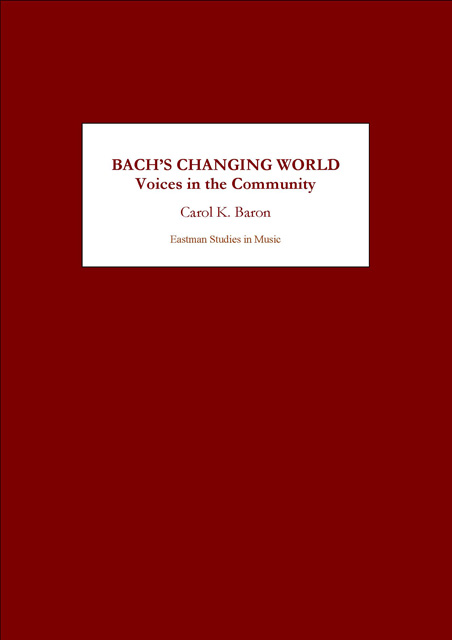Book contents
- Frontmatter
- Dedication
- Map
- Contents
- List of Illustrations
- Editor's Acknowledgments
- 1 Transitions, Transformations, Reversals: Rethinking Bach's World
- 2 Tumultuous Philosophers, Pious Rebels, Revolutionary Teachers, Pedantic Clerics, Vengeful Bureaucrats, Threatened Tyrants, Worldly Mystics: The Religious World Bach Inherited
- 3 Family Values and Dysfunctional Families: Home Life in the Moral Weeklies and Comedies of Bach's Leipzig
- 4 Bach in the Midst of Religious Transition
- 5 Bach's Situation in the Cultural Politics of Contemporary Leipzig
- 6 The Reception of the Cantata during Leipzig Church Services, 1700–1750
- 7 From Salon to Kaffeekranz: Gender Wars and the Coffee Cantata in Bach's Leipzig
- 8 A Treatise on Liturgical Text Settings (1710)
- 9 Random Thoughts About Church Music in Our Day (1721)
- Notes on the Contributors
- Index
- Eastman Studies in Music
8 - A Treatise on Liturgical Text Settings (1710)
Published online by Cambridge University Press: 17 March 2023
- Frontmatter
- Dedication
- Map
- Contents
- List of Illustrations
- Editor's Acknowledgments
- 1 Transitions, Transformations, Reversals: Rethinking Bach's World
- 2 Tumultuous Philosophers, Pious Rebels, Revolutionary Teachers, Pedantic Clerics, Vengeful Bureaucrats, Threatened Tyrants, Worldly Mystics: The Religious World Bach Inherited
- 3 Family Values and Dysfunctional Families: Home Life in the Moral Weeklies and Comedies of Bach's Leipzig
- 4 Bach in the Midst of Religious Transition
- 5 Bach's Situation in the Cultural Politics of Contemporary Leipzig
- 6 The Reception of the Cantata during Leipzig Church Services, 1700–1750
- 7 From Salon to Kaffeekranz: Gender Wars and the Coffee Cantata in Bach's Leipzig
- 8 A Treatise on Liturgical Text Settings (1710)
- 9 Random Thoughts About Church Music in Our Day (1721)
- Notes on the Contributors
- Index
- Eastman Studies in Music
Summary
Introduction
Bach's immediate predecessor at the Thomasschule in Leipzig, Johann Kuhnau (1660–1722), was a person of broadly cultivated tastes, with a decided literary flair that he developed successfully according to prevailing styles. His literary works interest us here since, quite side from being a successful composer, he left us documents that are unique and have been referred to in modern musicological studies as significant statements about current issues in literature, music, and religion—all of which, fortunately for us, drew his attention and are relevant for our study.
In 1700, Kuhnau published a novel entitled Der Musicalische Quack-Salber which, translated into English, is The Musical Charlatan. It is closely modeled on Christian Weise's earliest and most popular novel, Die drey ärgsten Ertznarren in der ganzen Welt (The Three Worst Arrant Fools in The Entire World), one of the author’s so-called “political” works, through which he taught young men appropriate behavior for working, primarily, in government positions in the electoral states. Weise's works were particularly influential in Thuringia and Saxony. (Chapter 1 cites Weise's works and discusses his contributions to the success of Saxon absolutism and the middle classes.) The protagonist in Kuhnau's adaptation is a clever braggart who pretends to be a musician and is ultimately unmasked, thereby evoking the derision and disdain whose underlying purpose is instructive. The penultimate chapter includes a list of sixty-four items of remonstrances and advice, under the heading “Der wahre Virtuose und glückselige Musicus” (“The True Virtuoso and Blessed Composer”), which summarizes the lessons to be learned.
Kuhnau's “Treatise on Liturgical Text Settings,” presented here in English translation, originally prefaced a set of cantatas composed for use at the Thomaskirche during the 1709–10 church year. It is an explanation of the process Kuhnau engaged in his work. Like his novel, it too models itself after a literary form, one that was developed, in this instance, by Christian Thomasius, Weise's most prominent student. Thomasius's significance in Leipzig, his difficulties at the university, and his later influence in the German territories were discussed in chapter 2. Although Thomasius was forced to leave Leipzig, the influence of his publications grew even there and is clearly found in Kuhnau’s literary style and intellectual conception.
- Type
- Chapter
- Information
- Bach's Changing WorldVoices in the Community, pp. 219 - 226Publisher: Boydell & BrewerPrint publication year: 2006



